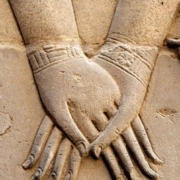Graceful Fluidity / Graceful Masculinity: Behar
Part of a periodic Torah series on graceful masculinity and Jewish values.

אֶת-שַׁבְּתֹתַי תִּשְׁמֹרוּ, וּמִקְדָּשִׁי תִּירָאוּ: אֲנִי, יְהוָה.
My Sabbaths shall you observe and My Sanctuary shall you revere – I am Hashem. (Leviticus 26:2)
Shabbat is in invitation for a time of deep and personal intimacy with G-d. It is also a time of great expansiveness to support the multifaceted spectrums of connectivity. We are told that on the shabbat we are given an additional soul to accommodate the soul’s dominance over the body, particularly in an arc of gender sensitivities.1
Although there is a dispute about which day of the month the Torah was given, “According to everyone it was given on the shabbos.” Shavuot is seen as the wedding between the Jewish People and G-d, that we prepared for by counting seven weeks from the blood of Passover (Zohar). The two tablets were given to affect the kiddushin under the chuppah of Mount Sinai (Haflah). Tradition also teaches that this is re-experienced every week with the shabbat (Igeres Hatyul). The Ari Z”l says it is reflected in the unique blessing in the Friday night prayer “Atah Kedashta” – which can either mean “you sanctified,” or “you betrothed.”
G-d’s identity in this relationship, like the People of Israel’s, is gender fluid. We find the Jewish people as a bride אֲרוּסָתוֹ שֶׁל הַקָּבָּ”ה יִשְׂרָאֵל – G-d’s bride is Israel (Rashi Exodus 34:1), and the tablets are the Shtar – marriage document (Baal Haturim Exodus 19:4) to the bride. Even the standard structure of the wedding blessing today, “Who sanctified your people Israel though chuppah and kiddushin,” is referring to the wedding between us and G-d at Sinai (Sheta Mekubetzes).
We also find that the Jewish People are referred to as the groom, marrying the Torah (Pesachim 49b), where G-d is the father of the bride (Shemot Rabbah 33:1), and the Mikdash – sanctuaries that we are commanded to build – are quarters for G-d, as G-d is our in-law who just wants to be close to us, wherever we are.
Unfortunately, the honeymoon is short lived. Just forty days later, we sinned against G-d in an adulterous act with the golden calf (Rashi Exodus 32:20 and Avodah Zarah 44a). G-d’s identity as the Creator necessitates our exclusivity in faithful monotheism. It also translates into the validation of this identity through the celebration of the Sabbath. The Rabbis go so far as to equate observing the Sabbath as a fulfillment of the entire Torah (Ohr Hachaim 26:2).
Maimonides, in concluding his laws of forbidden relationships, writes that “the greatest antidote to acting inappropriately is to turn oneself and one’s thoughts to words of Torah and immerse their mind in wisdom, because inappropriate thoughts do not rule in one’s mind except in the mind of one whose heart is turned away from wisdom. Regarding wisdom it is said, ‘It is a beloved hind, arousing grace. . . You shall be obsessed with her love (Proverbs 5:19).”
The Talmud (Eruvin 52b) explains the comparison teaching that “matters of Torah are cherished by those who study them each and every hour like the first hour.” Each part of this verse, according to the Vilna Gaon, refers to one of the four layers of the Torah’s פרדס – Pardes, and their corresponding levels of physical, and intellectual, intimacy.
One of the consequences of the breaking of the first set of tablets, at the sin of the Golden Calf, is the necessity for the oral law (Shar Yissaschar). The Torah is referred to as both male and female, even in the same verse (Exodus 12:49). It is also understood that the written skews masculine while the oral towards the feminine (Kiddushin 2b Ben Yehoyada). Reb Tzadok (Dover Tzedek) teaches that, although the entire Torah is from G-d, the written represents G-d’s wisdom while the oral is from Israel’s. The Zohar’s (3:73a) famous teaching that G-d, Torah, and Israel are one, can be understood as the process of G-d and the Jewish people sanctifying their union at Sinai through the written Torah, and then, coming together with the Oral Law (R’ Eliyahu Baruch).
There is no grace like the fulfillment of the Torah – אין חן כקיום התורה (Shevet Mussar). However unlike the Shabbat, that comes every 7 days with or without us, we are responsible for showing up to do our part in furthering the acceptance, understanding, and production of Torah. The more we revisit it, the newer, deeper, and more personal it becomes. As we prepare for Shavuot, let us feel empowered and embodied to expand our connectivity to it beyond just our lived experience, by experiencing it as part of the collective whole.
1. [See Shabbos as an All Gender Experience]↩

By R. Mike Moskowitz.









